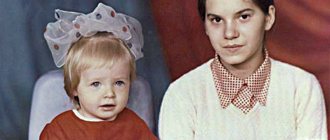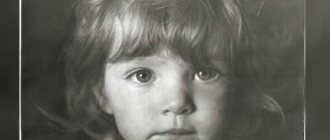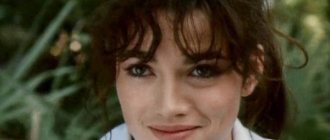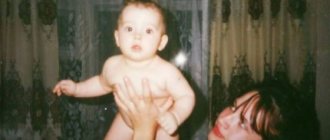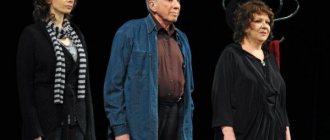Birth and family
The real name of the writer Daria Dontsova is Agrippina Vasilyeva. She was born on June 7, 1952 in Moscow.
Her father, Arkady Nikolaevich Vasiliev, was born in 1907. In his youth he worked in the political intelligence service of the OGPU. But then he took up literary activity, working in the editorial offices of the publishing houses “Rabochy Krai”, “Moscow”, “Krokodil”, “Ogonyok”. In the Moscow branch of the Writers' Union, he worked as secretary of the party organization. His debut as a writer took place in 1949 with the release of the collection of feuilletons “The Velvet Road”. Subsequently, Vasilyev wrote many stories, novels, scripts and feuilletons, many of his works were filmed (“Comrade Arseny”, “Monday is a Hard Day”).
The mother of the future writer, Tamara Stepanovna Novatskaya, was born in 1917 into a Polish-Cossack family. She worked as a director at the Mosconcert and was friends with many famous artists, whom she constantly accompanied on tour. Mom was a very cheerful, warm and sociable person. Tamara Stepanovna lived to be 101 years old, so along this line Daria Dontsova has wonderful long-livers genetics.
My paternal grandfather, Nikolai Vasiliev, worked at a weaving factory. Grandmother Agrippina, after whom her granddaughter was named, was a charwoman who washed floors. They lived very poorly, sometimes there was not enough money, not only for clothes, but even for food. But grandfather was ready to starve altogether just to buy expensive kerosene, a pencil and a notebook from the store. He kept diaries, and he did it according to the principle: what I see, I write. And when the grandmother was indignant because there was nothing to eat in the house, and her husband bought a notebook and pencil again, he calmly answered her: “Calm down, Grunya, I didn’t spend money on drinking or smoking. Understand, if I don’t write, I’ll get sick.” My grandfather had no education, but at the same time he felt an irresistible craving for writing. All this was passed on at the genetic level to their son Arkady Vasiliev, and then to their granddaughter Daria Dontsova.
My maternal grandfather was a Polish communist, his real name was Stefan Nowacki. But since he married and began to live in Russia, he fought together with Felix Dzerzhinsky, here he was given a Russian name - Stepan. Grandmother's name was Afanasia Shabanova, she came from a wealthy Kislovodsk family. In 1916, my grandparents got married and left for Moscow, where a year later the mother of the future writer was born. In 1937, my grandfather was arrested and died in the camps; he was posthumously rehabilitated. He foresaw his arrest, so he filed for a divorce in advance, and his wife and daughter were not touched.
Darya Dontsova. Biography facts
Daria Dontsova (real name Agrippina Arkadyevna Dontsova, nee Vasilyeva) was born on June 7, 1952 in Moscow. As a child, she lived the life of a spoiled girl of a select circle of children of the literary intelligentsia. In her youth, she had to prove her worth in journalism, which the girl, as it turned out, did not like. There were many intricacies in her difficult personal life.
It so happened that the turning point of her fate was a serious illness, which not everyone can cope with. Daria Dontsova succeeded, although the chances were minimal. And this lesson is the main thing she can share with all of us. It’s not for nothing that the writer is often called the “pill for depression.” This is now when she has long been successful, famous, and extremely in demand. But there were times when depression, fears, and doubts attacked her. And similar moments of weakness, even close to despair, for her, like for every person, happen from time to time even now. The trick is how to deal with them.
In the fate of any person there are episodes worthy of the pen of a wise writer of everyday life. But our heroine today, as it happens, has her whole life like an exciting novel. The books of Daria Dontsova, largely autobiographical, although they contain many secrets and mysteries, are popular precisely because of their stunning authenticity to life.
Childhood
When little Dontsova was born, her parents were not registered, since her father was still officially married to his previous wife. They all lived together with grandmother Afanasia in a barracks on Skakova Street.
When Dasha was two years old, the barracks were resettled, and her grandmother received a room in a communal apartment on Kirova Street. But the room was so small that it was not possible for four of us to live there. Therefore, the grandmother and granddaughter moved into a communal apartment, and the parents lived in a small apartment, which they shared with the Soviet writer Viktor Shklovsky. And only in 1957, my father received an apartment in a new building not far from the Airport metro station, where the whole family could finally move in.
From the age of four, the grandmother taught her granddaughter to douse herself with cold water in the morning. Since then, for sixty years, Dasha has not changed this habit; for her, this is the same necessary procedure as brushing her teeth. In the summer she even adds pieces of ice to a bucket of water, and in the winter she can easily go outside barefoot and wet herself while standing in the snow. Thanks to this, Dontsova, neither as a small child nor as an adult woman, practically did not know what a runny nose and a cold were.
In 1959, when Dasha went to school, her parents formalized their relationship. Along with the secondary school, they wanted to enroll Dontsova in music classes. But the teachers discovered that the girl had a complete lack of hearing for music. Mom and grandmother were crazy music lovers and began to take little Dasha to theater premieres of opera and ballet, to concerts at the conservatory, but the girl felt sad there.
The writer's parents
In Soviet times, Arkady Nikolaevich Vasiliev was well known in literary circles as a worthy writer. His works were published in the form of fiction and documentary prose, and Arkady Nikolaevich was highly respected by his colleagues. Apparently, it was from him that his daughter received the ability to write novels, which readers loved so much and are published today under the pseudonym Daria Dontsova. The writer’s biography developed in such a way that she spent many years writing her works. There were many interesting events and terrible troubles that Agrippina Arkadyevna was able to cope with, no matter what.
Daria Dontsova's mother's name is Tamara Stepanovna Novatskaya. When her daughter was born, the woman served as a director at the Mosconcert and was not married to the father of her child. But still, the lovers were able to reunite after Arkady Vasiliev divorced his first wife. At the time the parents were able to get married, their common daughter Agrippina was already two years old. Daria Dontsova's biography is filled with frequent separations from her parents in childhood.
Studies
At school, Dontsova was not an authoritative figure for her classmates. And she studied mediocrely, mastering the exact sciences with great difficulty. But Dasha loved humanitarian subjects; she was especially good at foreign languages; now the writer is fluent in French and German.
Since her father was a member of the USSR Writers' Union, Dontsova spent her entire summer vacation in Peredelkino, where she often spent time with the famous children's writer Korney Chukovsky.
Literature fascinated Dasha madly, and genetics made itself felt. Even when in 1964 the girl first visited her father abroad (his book was going to be published in Germany, and he was invited to this country), she brought from there not clothes and trinkets, but a bunch of detective novels.
Therefore, it is not surprising that after graduating from school, Dontsova chose the journalism department of Moscow State University for further study. In 1974 she received a diploma of higher education.
Student life, career
When it was time to go to college, the girl chose Moscow State University, Faculty of Journalism. It was not difficult for a well-read and intelligent girl who also spoke two foreign languages in her early years to enter there. While still at school, Agrippina visited Germany with her father, where she felt great in terms of communicating with the Germans. The talented student was especially good at German, so from the trip she brought back a lot of positive impressions and many German detective stories.
After studying at the Faculty of Journalism and successfully graduating from university, Daria Dontsova (writer) got a job as a translator. Her biography at that moment was not yet full of prerequisites for the craft of writing. Agrippina successfully used her French skills while working in Syria as a translator at the Soviet embassy.
Labor path
Dasha was twenty years old when her dad died. And a month after the funeral, she gave birth to her first child - a son, Arkady. The relationship with my first husband did not go well. Dontsova was still studying at the university and working part-time as a journalist at Vecherka; sometimes this salary was not even enough for food; it happened that potatoes had to be bought by the piece, and not by the kilogram. But she was lucky in life in that every time things became very bad or almost unbearable, fate gave her a meeting with good, kind people who helped, encouraged and inspired hope. After all, sometimes one word is enough to stop considering yourself a person driven into a corner.
After graduating from university, Dontsova went to the Syrian city of Aleppo, where for two years she worked at the Soviet Consulate as a translator from French. Returning to the USSR, she worked for seven years as a journalist in periodicals - the Fatherland magazine and the Evening Moscow newspaper.
Since 1985, Dontsova began to earn money by giving private foreign language lessons. A year before, she wrote her first work - a story about steelworkers, but the magazine "Youth" was not interested in her work. This ended the career of a writer who illuminates the exploits of the working Soviet people.
Daria Dontsova: I come to visit my daughter and I’m jealous
Usually children grow up and leave their parents' home to live their own, independent, adult lives. But for Daria Dontsova, everything turned out exactly the opposite - nine years ago, the writer and her husband left their Moscow apartment, exchanging it for a country house. At that time, my fifteen-year-old daughter Masha remained in Moscow “on the farm.”
“Whatever you want, children become independent,” says Daria. “We started building a house, the process required supervision, my husband and I had to rent a house outside the city, not far from our construction site. And Manya went to school - getting up early, it’s impossible to get to Moscow with all the traffic jams. That’s how I turned from a mother into a viper - I left my child at the age of 15 alone in the apartment.” Masha, by the way, was not at all scared, she didn’t even switch to fast food, as most of her peers would have done in her place. The girl learned to cook, successfully graduated from school, then university and got a good job. In fact, of course, the parents did not abandon the child - Daria and her husband kept running into the city to visit their daughter. In turn, Masha learned to drive a car and, as soon as she turned eighteen, she began to travel to the Moscow region, where she was given an entire floor in a new house.
At the family council, more than once they thought about selling the Moscow apartment, but Masha defended the family nest. “My daughter is right,” thinks Daria. “Someday she will have children, and she will tell them: your great-grandfather, a writer, lived in this apartment, your grandmother wrote detective stories.” The apartment, although small, is located in a very prestigious building. It belonged to the Writers' Union; on each floor there lived a classic writer. A good inheritance for Masha’s children...” Dontsova did not have time to finish. Masha appeared and sternly said: “I won’t write to the children. I'll leave everything to the homeless cats. Because they hunt pigeons." Pigeons are a sore subject. The upstairs neighbors like to feed these unpretentious birds; they eat with appetite, and the waste from this fascinating process turns the Dontsovs’ balcony into the main square of Venice.
in miniature... Here, by the way, is the disadvantage of living in the same house with people who are accustomed to being respected by everyone - the Dontsovs took an unprecedentedly long time to renovate the apartment, because the residents kept trying to call the police and interrupt the process, even when by law it was possible to knock and drill. But being next to eminent citizens has many advantages. For example, about three years ago, they decided to build a 16-story residential tower in the courtyard of a prestigious writer’s building, but the classics and their relatives came out to a rally - and the courtyard remained untouched...
In a word, this is how the writer’s daughter grew up, applying the knowledge gained at the Moscow State University psychology department to the practice of an apartment hostel, and at the same time mastering the difficult science of repairs. First, Masha got rid of all unnecessary things, and in a simple, modern way - she posted an ad on the Internet. “People didn’t just walk, they ran to us for things,” Daria is surprised. — One of the main arguments is that they bought an apartment, but there is no money for furniture. So they’re looking for a decent used one.” Not only the kitchen flew away with a whistle - it was dismantled and stolen by a friendly family in two hours, but even the doors, their frames, curtain rods and a coat rack in the hallway. Masha’s phone kept ringing. I especially remember one call from a lady claiming a “wall” from the living room. “Sorry, we’ve already given it away,” said Masha. After a heartbreaking pause, the telephone receiver quietly asked: “Tell me, what was she like?”
Having parted with our things, we began to repair. Having suffered through the construction of a country house, in which everything had to be redone and rebuilt more than once, Daria became a real expert both in building materials and in communicating with construction superintendents. “Oh, I’m already an experienced person,” Dontsova smiles. “In the repair battles, I strangled all intelligence in myself, so that any foreman is easily eliminated, with parting words in the great and mighty Russian language. Even seasoned specimens trembled with horror as soon as they heard my voice on the phone.” True, this was the only way the writer could help her daughter. Masha had to take full responsibility for the search and purchase of building materials. And not because she and her mother have different tastes - Daria likes absolutely everything that Masha chose. But as soon as the famous writer appeared on the doorstep of the store, building materials magically tripled in price. The Dontsovs’ driver, who always accompanies the miniature Daria on shopping trips, every time he heard about the next rise in price, shouted a phrase that has long become a catchphrase in the Dontsov family:
“Don’t you dare buy this! You will die in poverty! This dramatic scene was repeated with enviable consistency both in branded showrooms and in construction markets, so one day, having received an estimate for a parquet board in which the number of zeros in the price did not fit on the page, Dontsova was forced to “go underground” and admire her daughter’s acquisitions "in fact". “It’s amazing how Masha feels space,” Dontsova admires. — A compact apartment has turned into something special. But it only took a couple of walls to break and some things to be moved!” Now there is a large hallway - Daria has dreamed of this all her life. A convenient dressing room was built from part of the corridor that previously led to the kitchen and toilet. From two small rooms it turned out to be a very decent sized living-dining room. The small room where Dontsova initially wrote her detective stories is now an office, and in the nursery, where little Dasha, then called Grunya Vasilyeva, once taught her homework at the desk, is now her daughter’s bedroom.
While still a schoolgirl, Masha enthusiastically selected her mother’s wardrobe, and once she started renovating, she unleashed her design talents to the fullest extent. Not a single architect or designer has ever crossed the threshold of the apartment - absolutely all the ideas for arranging the space, for choosing colors and interiors belong to Masha. Neither mom nor dad interfered in the process. Dad, Alexander Ivanovich Dontsov, is in the family, as he says
Daria makes strategic decisions. “For example, is it necessary to build a road from Moscow to St. Petersburg. And with all sorts of trivial problems - where to go on vacation or what to spend money on - my daughter and I usually sort it out; there’s no need for dad to fool his head with everyday trifles,” the writer is sure. By the way, Alexander Ivanovich really likes everything that Masha has done in the apartment. To the best of his ability, he tries to participate in the arrangement - he gives his daughter cute trinkets. “He really loves this. For example, I bought a wooden elephant for Masha, and dad was so delighted that he immediately gave it to her,” Daria grumbles. Dad also tirelessly gives his daughter paintings of cats. The family has long divided the objects of love - Dontsova adores pugs, and Alexander Ivanovich’s heart is forever given to cats. Masha diplomatically hangs pictures of dogs, cats, and abstractions on the walls. You can find a suitable corner for any item, the young housewife is sure.
The writer considers her daughter to be a sorceress when it comes to finding suitable things: “When I see a lamp chosen by my daughter in a store - huge, like a pumpkin, of an unimaginable color, I think - what a terrible thing! It would be better if I bought a lampshade with fringe. And Masha hangs it up, and I suddenly realize how beautiful it is! I come to my daughter and every time I start to get really jealous - I like everything about her so much!” The lamps in the apartment are very different - in the kitchen the chandelier consists of many glowing glasses, in the living room two giant paired lamps hang from the ceiling, one golden, the other silver, the same ones that Daria didn’t like at first. On the floor near one of the walls there is a basket, seemingly full of crumpled paper - this is also such a lamp; a couple of times unprepared people tried to pull out the “paper” in fright to prevent a fire.
Masha loves unusual things, looks for them everywhere and is happy to find a place for them. This is how a vinyl cat appeared in the apartment, hanging upside down on the air conditioner, a shiny blue bunny on the table in the living room, multi-colored chairs and armchairs in the dining room, cute balloons floated on the tiles in the bathroom, plugs of electrical appliances need to be stuck into the snouts of funny pigs attached along with sockets . And the walls of the toilet were decorated with tiles depicting... bookshelves. This joke was performed specifically for the mother-writer, since Daria more than once said that “a popular writer is the one whose book is in the toilet at your house.”
7 days
Subscribe to our Telegram. We send only “last minute” news!
Disease and victory over it
In the summer of 1997, Dasha went on vacation to Tunisia with her family and friend. A week later, she discovered that her breasts no longer fit into the top of her swimsuit. Daria herself was happy about this, and she shared the news with her friend, who was a doctor by profession. However, my friend did not share the joy and advised me to immediately interrupt my vacation and go to Moscow for an examination with an oncologist.
But Dasha did not interrupt her vacation, and upon arriving home she completely forgot about her friend’s advice. She went to the doctor when her chest began to hurt badly. The verdict was given to her quickly: “Breast cancer.” An endless series of hospital procedures began - a puncture, a bunch of tests, preparation for the operation, horror stories that women told under the offices, then came the fear that you might not wake up from anesthesia.
In the end, Dasha underwent surgery and it went well. Then there was a rehabilitation period. As the writer herself says, oncology is a kind of litmus test. It helps to fully reveal the character of the sick person and the true qualities of those people who surround the patient. Now Daria clearly states that she shares her victory over this terrible disease with her family and friends who supported her during a difficult period in her life.
It was this disease that radically changed the life of Agrippina Vasilyeva and made her the most famous modern writer in Russia - Daria Dontsova.
Daria Dontsova: “I feel sorry for my readers: apparently, they are not very happy”
Daria Dontsova's first novel, “Cool Heirs,” was published in 1999. And in a matter of months she became one of the most popular writers in Russia. And then the most popular: for many years she has topped the ranking of authors whose books are published in Russia with the largest circulations. Over 20 years, she published 219 detective stories, with a total circulation of more than 200 million copies.
The modest anniversary was celebrated with a press conference, at which Daria presented a new book about the “private investigation lover” Dasha Vasilyeva (she was also the heroine of her debut novel). Dontsova was asked how many books about Dasha Vasilyeva she wrote? “I don’t count them,” answered the writer; The publishing house staff came to her aid, and it turned out that the latest novel, “The Prince with a Bad Resume,” was already the 59th in a row. Moreover, the next, 60th book, has already been practically written, but has not yet been published.
Dontsova’s performance has become legendary. Over the years, rumors have spread that she uses, but, according to the general director of the Eksmo publishing house, Evgeniy Kapyev, it’s all about discipline and energy. “We often believe that the author sits on the wall, waiting for a deep thought to come, inspiration to come, and he will write something. But no other world author works like this. This way you can write a book once. In general, writing is a profession with discipline and demands on oneself.” Dontsova writes every morning for several hours, this allows her to publish several books a year.
And, of course, the writer herself spoke about the secrets of her success.
* How did I come up with the idea of writing books? She wasn't there. I started writing books in the intensive care ward to take my mind off the situation there (Dontsova underwent several operations for breast cancer. - Ed.). I didn’t intend to become a famous writer, I didn’t want money, fame, nothing. I had the task of surviving for at least six months, I decided that if I survived this period, then everything would go very well. And I just had a desire to write. I can't explain it, there aren't enough words. I still really want this. I just sit and work, that's all.
* For the most part, I feel sorry for my readers: judging by Instagram and the questions that people ask, they are not very happy in life. We have to explain to them that a person is happy when he does not want what he does not have and is happy about what he has. When you explain this, the person feels better.
* I never know how a book will end. People ask me: “Are you planning a novel?” Yes, I am thinking through the plot, yes, I have a ready-made idea in my head. I start writing knowing that the killer is my grandmother. And on the third page of the manuscript, this nasty grandmother gets hit by a tram. Everything is flying away, I don’t understand where, I’m trying to restore everything, my grandmother is brought to the hospital and revived. Well, they cut off her head - they sew it back on. But five minutes later the grandmother falls out of the window. And then I finally understand that I am not able to cope with it. This probably sounds like some kind of nonsense, but it is not the writer who controls the manuscript, but the manuscript that controls the writer. And, probably, it’s much more interesting for me to write than for people to read later. The reader can leaf through the book, but I cannot.
* I write books by hand, but my handwriting is terrible. For many years, Nadezhda Vasilyevna Volkova has been helping me type texts; she parses these Chinese characters. I only work on the computer when I post on Instagram or answer emails. I really don't like it, and I'm very bad at it.
* When you write a book, you sit in it, you are inside it, and what happens there becomes reality for you. For example, Dasha Vasilyeva is monstrously rich. It makes no difference to her what products to buy; she doesn’t count pennies. And if, while writing a book about Dasha Vasilyeva, I go to the store, I give my wallet to the accompanying person - or one of the family members, or, say, the driver. Some reasonable and responsible person. My credit card is out of my hands because I know I could spend a lot of money. There was also a case when I was writing a book, and the family was getting ready to go somewhere for lunch. They shouted under my balcony, “We are waiting for you!” I think: “Okay, I need to get dressed.” I went to the dressing room and didn’t find my warm sweaters and jackets - someone had hidden them. With difficulty, I found it, got dressed, went downstairs, and saw that everyone was wearing shorts and T-shirts. They sighed: “Well, we understand everything - December is in your book. Go change clothes, please...”
* Now I have four pugs and one half-pug, a cross between a beagle. It's called a puggle. Never get a puggle, he will eat everything in your house.
* Do I have time to read something? Since I have been reading for a long time and in three languages - Russian, German and French - I have read the entire volume of classical literature and passed exams to old-school Moscow State University teachers. I still remember the description of the shield of Achilles from the Iliad by heart, although I don’t know why I need this in modern everyday life... I went through very different stages in my love for books. As a child, there was Janusz Korczak with the wonderful book “King Matt the First”, there was Jack London, Mine Reid, “The Forsyte Saga” by Galsworthy. There was an incredible love for Alexei Tolstoy. That's how I walked up those steps... I voraciously read detective novels; my father (writer and screenwriter Arkady Vasilyev - Ed.) was published by a West German publishing house, and from there they sent everything that was not available in Russia. Dick Francis, Agatha Christie - it’s impossible to say what I didn’t read in German. And lately I’ve been doing well with books about animals - for example, “Notes of a Country Vet” by James Herriot. And I feel very good with my colleagues in the genre. I really love Tanya Polyakova, Tanya Ustinova and Alexandra Marinina, and I always read their new books, it’s very interesting to me.
*Hand on heart, I really want to go to bed quietly at 11 pm on New Year’s Day, and for all the guests to have fun without me. This New Year, I hope, my daughter will come with her company of about 50 people, and they will arrange everything without me. Two sons, a daughter, a bunch of grandchildren - and at 12 I’ll drink a glass of champagne and then go to bed.
* Do I have something that I haven’t achieved that would make me happy? What rewards do I want? I want the Lord to leave me sane and so that I can write books. To give him a working right hand and head - and that’s all.
Creation
When Dasha was recovering from surgery, her husband brought her a pen and notebook to the hospital. To take her mind off the terrible illness, she began to write. In just five days, Dontsova created her first book, “Cool Heirs.” And when her course of treatment in oncology came to an end, five books were already ready for publication.
Her first works were received with a bang by readers, so the EKSMO publishing house, with which Dontsova began collaborating, was interested in her new works. And they were not long in coming.
Daria writes in the genre of an ironic detective story; she sometimes copies the heroes of her works from herself, her family, acquaintances, and friends.
Over almost twenty years of writing, her work can be divided into six cycles, in each of which private investigations are conducted by a new detective personality:
- wealthy, intelligent woman Dasha Vasilyeva;
- daughter of a general and opera singer Evlampiya Romanova;
- German language tutor Viola Tarakanova;
- son of the Soviet writer Ivan Podushkin;
- teacher of Russian language and literature Tatyana Sergeeva;
- student of the Pedagogical Institute Stepanida Kozlova.
People love her books for their cheerfulness and optimism; they teach them to treat the world more kindly. For her creative achievements, Daria Dontsova has repeatedly won the Writer of the Year and Bestseller of the Year awards. Many of her works have been filmed.
The first detectives of Daria Dontsova
In 1999, the first book in the detective genre was published under the name of Daria Dontsova.
It was written in just five days. The aspiring writer called it “Cool Heirs.” The main character of the novel was Dasha Vasilyeva, who is interested in private investigation. She wrote the novel in the hospital, where she was at that time fighting a serious illness. When Dontsova left the hospital, she already had five novels ready for publication. The success of the first detective was considerable; readers perfectly accepted the writer’s works. The publishing house with which she signed an agreement is called EKSMO. To date, Daria Arkadyevna has written and published more than one hundred of her novels with a total circulation of more than two hundred and thirty million books. She has many admirers of her talent who look forward to each new book. As soon as a new novel appears, it immediately becomes a bestseller.
Daria Dontsova | Writing Pug Dontsova is recognized as one of the most published authors in Russia. The writer spends about a month writing the next novel. It is known that the Guinness Book of Records of Russia considers Dontsova the most prolific writer, who managed to publish more than a hundred books in ten years.
Dontsova's detective stories are published not only in Russia and the countries of the former USSR, but also in Western Europe, and even in China.
The writer’s optimism is felt in her works. Readers call her detective stories “pills for depression.” Many would like to have the opportunity to consult with Dontsova. Even her autograph is considered by many to bring good luck. The writer publishes not only detective stories. She wrote a cookbook as a beginner's guide. Its title is “The Lazy Woman’s Cookbook.” She also published an autobiographical work, “Notes of a Mad Optimist.”
Dontsova's books became so popular that they became the basis for films. Thus, based on the writer’s works, series were filmed about detectives Ivan Podushkin, Viola Tarakanova, Dasha Vasilyeva and Evlampiya Romanova. They were played by such actors as Dmitry Kharatyan, Tatyana Vasilyeva, Valery Garkalin, Sergei Astakhov and others.
Personal life
Dasha Dontsova was married three times. In her first marriage, she gave birth to a son, Arkady, who today has been happily married for a long time and pleased his mother with his grandson Nikita. Despite the birth of Arkasha, Daria and her husband soon divorced.
The second marriage also did not turn out to be happy.
In 1983, Dasha married a doctor of psychological sciences, professor at Moscow State University, academician Alexander Ivanovich Dontsov. In this marriage, a girl, Masha, was born in 1986. The daughter grew up a long time ago, graduated from Moscow State University, got married and gave her parents another wonderful grandson, Misha.
Dontsova is a crazy animal lover. Several dogs and cats live in the house permanently, and animals also become indispensable heroes of her works. The writer especially loves pugs; Dasha now has four of them, and a cat and a turtle also live with them.
About personal life
Her first marriage was precocious and therefore fleeting. She hurried down the aisle to escape from the care of her parents, but literally a few months after the wedding there was a divorce. The main fruit of this union was the son Arkady.
In various TV shows we see Daria Dontsova’s stories about her personal life and her husbands. She often talks about how she met her second husband: he was a witness at her first wedding, and she fell in love with him there. But this alliance turned out to be not very strong.
After two divorces, Agrippina decided not to experiment anymore, to live for herself. But her neighbor thought differently. She had an “insidious” plan to introduce Agrippina to psychologist Alexander Dontsov, also divorced at that time.
She invited both of them to her birthday, but both of their first impressions of each other were far from flattering. Apparently, the artificiality of the situation put pressure on both sides. Almost a month later, a persistent neighbor brought Sasha to visit Gruna.
The first phrase that the hostess said was: “I don’t want to get married!” Dontsov agreed: he, in fact, is also against these efforts of a mutual friend. They laughed together at the failed matchmaking and drank tea. And then suddenly there were common topics for conversation.
It all ended with a third marriage: it was in 1983 that Agrippina became Dontsova. And soon the couple had a daughter, Masha.
When talking about the biography, personal life and children of Daria Dontsova, biographers, journalists and admirers of her talent often remember her stepson. It so happened that the third child in the family somehow quite naturally became Alexander’s son from his first marriage, Dmitry. At first he simply visited his father, then he began to visit more often, and in the end he completely moved into the Dontsovs’ house.
Secrets of being slim
Dontsova is not at all embarrassed by her age. Dasha believes that old age manifests itself in rigidity. This is when a person constantly adheres to the same life pattern, does not want to learn something new, has lost interest in work, travel and friends, when everything around him irritates him. Dontsova’s main principle is to prevent such internal aging. And the external signs of age are not so scary, especially since they can be overcome with physical activity.
Although until the age of 45, Dasha did not engage in sports at all. I could go to the pool once a week, but without much enthusiasm. And after cancer, Daria was prescribed hormonal medications, from which she began to gain weight. And then fitness clubs appeared in her life. And for the past twenty years, Daria has been doing fitness training three times a week under the guidance of a trainer. Her workout lasts three hours, two of which are hard exercises with dumbbells and barbells, and one hour of muscle stretching.
Dontsova went on a diet once in her life, when her weight reached 75 kg after her first birth. Since then, she has completely reviewed and changed her diet: she just eats some things and doesn’t eat others. Her diet does not include sausages, pork or beef, or sweets. But the writer’s daily menu includes chicken and turkey, cheese and cottage cheese, and fish. He eats bread rarely and only without yeast. In general, Dasha came to the conclusion that people get fat not from food, but from overeating. If she feels hungry during the day, she fights it with nuts, dried fruits, a banana or a piece of natural dark chocolate.
Dasha openly encourages everyone: “People, do any kind of sports, at least just walk and walk more!”

